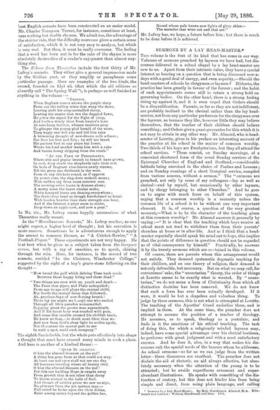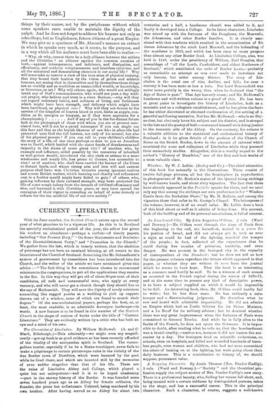SERMONS BY A LAY HEADMASTER.*
Tuts volume is the first of its kind that has come in our way. Volumes of sermons preached by laymen we have had, but dis- courses delivered in a school chapel by a lay head-master are new to us. Apart from their intrinsic value, they have a special interest as bearing on a question that is being discussed now-a- days with a good deal of energy, and even asperity,—Should the head-masters of schools be clergymen or laymen ? Hitherto, the practice has been greatly in favour of the former ; and the habit of such appointments seems still to retain a strong hold on governing bodies. On the other hand, there is a strong feeling rising up against it, and it is even urged that Orders should be a disqualification. Parents, so far as they are not indifferent, are probably inclined to the clerical rather than the lay head- master, not from any particular preference for the clergyman over the layman, as because they like, however little they may believe themselves, that the teacher of their children should believe something ; and Orders give a quasi-guarantee for this which it is not easy to obtain in any other way. Mr. Almond, who is head- master of Loretto, gives in his preface an interesting account of the practice at his school in the matter of common worship. Two-thirds of his boys are Presbyterians, but they all attend the school services. "These consist, on Sunday mornings, of a somewhat shortened form of the usual Sunday services of the Episcopal Churches of England and Scotland,—considerable latitude being exercised in the choice of Psalms and Lessons ; and on Sunday evenings of a short liturgical service, compiled from various sources, without a sermon." The "sermons are preached, not only by some of my colleagues—lay as well as clerical—and by myself, but occasionally by other laymen, and by clergy belonging to other Churches." And he goes on to argue with much force on behalf of this system, urging that a common worship is a necessity unless the common life of a school is to be without one very important element. It is, of course, a question of the very greatest moment,—What is to be the character of the teaching given at this common worship ? Mr. Almond answers it generally by saying ;—" It is clear that the teaching which boys receive at school must not tend to withdraw them from their parents' churches at home or in after-life. And as I think that a head- master especially should speak his mind out to boys, this implies that the points of difference in question should not be regarded as of vital consequence by himself." Practically, he answers it by the twenty sermons which are co-tamed in this volume.
Of course, there are parents whom this arrangement would not satisfy. They demand systematic dogmatic teaching for their children, and on one theory of religion, their demand is not only defensible, but necessary. Bat on what we may call, for convenience' sake, the " unsectarian " theory, the order of things at Loretto seems to be exactly what is wanted. By " unsec- tarian," we do not mean a form of Christianity from which all distinctive doctrine has been removed. We do not know that such a form has ever been actually developed. If it were, it would be but a shapeless and valueless thing. To judge by these sermons, this is not what is attempted at Loretto. The teaching of the Apostles' Creed underlies them, and is implied in them. At the same time, the preacher does not attempt to assume the position of a teacher of theology. He assumes, so to speak, theology as a postulate, and finds in it the sanctions of his ethical teaching. The task of doing this, for which a religiously minded layman may, indeed, have some special advantage over his clerical brethren, he performs with great judgment and with a most satisfactory success. And he does it, also, in a way that makes his dis- courses snit the special needs of the hearers whom he addresses. As school sermons—as far as we can judge from the written letter—these discourses are excellent. The preacher does not disdain the aid of rhetoric, an aid always effective, but abso- lutely necessary when the attention of the young is to be attracted ; but he avoids superfluous ornament and super- abundant illustrations. He speaks with something of the dis- tinction of oratory, but this does not hinder him from being simple and direct, from using plain language, and calling • Sermons by a Lay Head-Master. By Holy Hntobinson Almond, M.A. Edin- burgh and London William Blackwood and Sons. 1886.
things by their names, not by the periphrases without which some speakers seem unable to maintain the dignity of the pulpit. And he does not forget to address his hearers not only as schoolboys, but as Englishmen, future citizens of a great Empire. We may give as a specimen of Mr. Almond's manner an extract in which he speaks very much, as it seems, to the purpose, and in a way which all his audience must have been able to realise :—
" Why, oh why, cannot there be a holy alliance between the athlete and the Christian ? an alliance against the common enemies of both,—against intemperance, and indolence, and dissipation, and effeminacy, and testhetic voluptuousness, and heartless cynicism, and all the unnatural and demoralising elements in our social life ? Why will some take so narrow a view of the true aims of physical training, that they bound their horizon by the vision of prizes and athletic honours, not seeing that in themselves and by themselves these things are as worldly and as worthless as masanctified wealth, or knowledge, or literature, or art ? Why will others, again, who would not willingly break any of God's commandments, who would not pass a day with- out prayer, who believe and trust in a risen Saviour,—why will they not regard sedentary habits, and softness of living, and feebleness which might have been strength, and delicacy which might have been hardihood, as physical sins ? Why will they not devote to the service of the kingdom of heaven blood as pure, limbs as supple, con- dition as fit, energies as buoyant, as if they were aspirants for a championship P And if any of you in the far-distant future look at the photograph of those with whom you are at present asso- ciated here, will it not be a proud retrospect if you can single out this face and that as the boyish likeness of one who in after-life had presented unto God the full harvest, not only of his mental, but also of his physical powers ? if you can tell to your children's children the story of a life, of one once perhaps as dear to you as Jonathan was to David, which battled with the sister fiends of drunkenness and impurity in the slums of some great city ? of another, who, by example and influence, aided possibly by the resources of inherited or well gotten wealth, introduced the city clerk or artisan to a more wholesome and manly life, less prone to disease, less accessible to vice ? or of another, who shall have carried the banner of the Cross to distant lands, and whose strong arm and iron will and earnest purpose shall have won Christian victories among ignorant natives and coarse British traders, which learning and charity and refinement cast in a feebler mould might have failed to gain ? of others, who, gaining influence by their cultured strength, may have protected the life of some rough colony from the inroads of civilised effeminacy and vice, and leavened it with Christian grace, or may have spread the contagion of their vigour in crusading on behalf of some remedy or reform for the too artificial life of our own society ?"



































 Previous page
Previous page